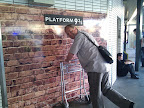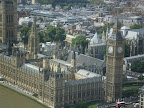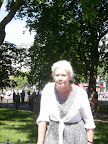 My wife and I went on a vacation to London, leaving Ottawa on July 18th, and returning August 1'st. While we did the traditional tourist things, this is not what has been stuck in my mind since.
My wife and I went on a vacation to London, leaving Ottawa on July 18th, and returning August 1'st. While we did the traditional tourist things, this is not what has been stuck in my mind since.
I was a Copyfighter in London, so of course I sent an email to Cory Doctorow to see if we could meet in person. We met on the 26'th at Shoreditch House, his club. Among other things he handed me a discussion draft of his latest young adult book: Pirate Cinema (Third manuscript printing from May 18, 2011).
From the beginning there was a familiarity that I loved from when I read Someone Comes to Town, Someone Leaves Town. Someone was set in Toronto, and had fictional characters doing things which were part fiction, part science, that made the line between what was real, what could be real, and what was pure fantasy sometimes a bit of a blur.
Pirate Cinema is set in London, surrounding many of the places I had been which made reading it feel like an extension of my vacation. It was, however, a different London than we saw as tourists.
 The protagonist was 16 when he ran away from home to live in the streets (and abandoned buildings) of London, eating "garbage", and so-on. Arriving in Victoria Station, the book is written from his eyes as if it were written by him to document the events of his recent past.
The protagonist was 16 when he ran away from home to live in the streets (and abandoned buildings) of London, eating "garbage", and so-on. Arriving in Victoria Station, the book is written from his eyes as if it were written by him to document the events of his recent past.
My wife and I commented when we were in London that we didn't see the social issues we expected to see. Young people have been disenfranchised, with high youth unemployment. Government policies were only one part of the complex things which were causing people to feel disconnected from society. Everything seemed to be calm, with everyone being polite: the only instance we saw of road-rage was once in Greenwich.
 We were back in Ottawa when the fire was lit, and London started to burn.
We were back in Ottawa when the fire was lit, and London started to burn.
The flames were lit after a peaceful march on 6 August 2011, that was tied to the fatal shooting of Mark Duggan by police. That may have been the spark, but what followed for 5 days is far more complex that will take a very long time to understand. Sure, some out-of-touch politicians are trying to point fingers at the immorality of youth, but reality can't be simplified this way.
This is where science fiction can come in to tell a simpler story. The fictional character of Trent McCauly (AKA: Cecil B. DeVil) left for the streets of London because he felt to blame for his family losing their Internet connection. This caused among other things for his father to lose his job, mother to lose access to medical treatments, and sister to no longer have access to the educational materials she needed to keep up her grades in school. In his eyes he had destroyed his family, felt to be a burden on them, so ran away.
Bad Copyright law is a simple story telling tool for a number of reasons. It has been proposed many times to have Internet connections would be cut off based on the mere accusation of de-minimus copyright infringement by one member of a household. In the case of Trent it was for Appropriation Art, an activity which a growing number of people don't think should be illegal, but instead clearly protected as legitimate creativity by Fair Use style exceptions.
Current proposals for Copyright law expansion are examples of laws where the punishment does not fit, and goes many magnitudes beyond the offence. I've made comparisons between how we treat copyright law and election law, clearly suggesting that if we treated election law with a similar level of severity that the currently ruling Canadian Conservative party would have been de-registered and disbanded.
It is a type of law that demonstrates the hypocrisy that many youth (and adults) feel: that they are criminalised for doing relatively harmless things while a few at the top of the political and economic classes of society are barely given a public tongue-lashing for far more seriously harmful activities. A small theft will get you jail time, but a big theft will get you a government bail-out.
There is a truth that these politicians seem to be blind to: once you make relatively harmless activities have excessive punishments, this reduces the social and moral deterrents to someone carrying out harmful activities (violence, vandalism, theft of tangible property) that may even have lesser punishments.
I find the mere suggestion by a politician that cutting off of the Internet based on copyright infringement to be embarrassing and an example of the type of out-of-touch thinking that leads to the break up of social cohesiveness we saw in London. But this is only one tiny example of bad public policy what is clearly a much larger issue, but the complete silliness and realistic feeling of this example made for good fiction in Cory's book.
 When I arrived in London the politicians and much of the mainstream media were gripped by the silliness of the phone hacking scandal. I am no fan of Rupert Murdoch's media empire (that's an understatement), but why is it that when the government wants to surveil average citizens (IE: warrant-less wiretaps proposed in Canada under so-called "Lawful Access") that this is considered a necessity, but when the private sector surveils politicians and those connected with politicians it is a big scandal that goes on for weeks. As much as I loathe the fiction that much of the media passes off as news, and the harmful activities they will carry out to collect "evidence" of that fiction, I put far more blame on the hypocrisy of the politicians who always want to point fingers at someone else as being the perpetrator of immoral/illegal activities. Some level of accountability and responsibility must eventually rise to the top.
When I arrived in London the politicians and much of the mainstream media were gripped by the silliness of the phone hacking scandal. I am no fan of Rupert Murdoch's media empire (that's an understatement), but why is it that when the government wants to surveil average citizens (IE: warrant-less wiretaps proposed in Canada under so-called "Lawful Access") that this is considered a necessity, but when the private sector surveils politicians and those connected with politicians it is a big scandal that goes on for weeks. As much as I loathe the fiction that much of the media passes off as news, and the harmful activities they will carry out to collect "evidence" of that fiction, I put far more blame on the hypocrisy of the politicians who always want to point fingers at someone else as being the perpetrator of immoral/illegal activities. Some level of accountability and responsibility must eventually rise to the top.
 When I visited speakers corner I was treated to a man trying to clarify that terrorist activities carried out in the name of Islam are not only wrong under the laws of every country, but also against all the teachings of Islam. This is common and necessary education to far too many in the west who seem to equate their religion with good, and other religions being evil.
When I visited speakers corner I was treated to a man trying to clarify that terrorist activities carried out in the name of Islam are not only wrong under the laws of every country, but also against all the teachings of Islam. This is common and necessary education to far too many in the west who seem to equate their religion with good, and other religions being evil.
 It was a white woman (only woman speaker there) that threw me: she believed in Brittan for the British, and was opposed to multiculturalism. She was condoning the white Christian terrorist Anders Behring Brevik who had killed so many youth days earlier, based on his political opposition to multiculturalism.
It was a white woman (only woman speaker there) that threw me: she believed in Brittan for the British, and was opposed to multiculturalism. She was condoning the white Christian terrorist Anders Behring Brevik who had killed so many youth days earlier, based on his political opposition to multiculturalism.
There were real important and divisive issues gripping London, some of which could even be easily seen by a tourist, and the politicians seemed gripped in the theatre of comparatively minor issues -- issues that were largely of their own creation.
There are raves and unlawful movie screenings (content and location :-), but no riots in Cory's book. It is written for youth, and like his other young adult books doesn't have a condescending tone or attempt to be moralistic towards young adults. There are obvious messages in the book about actively participating in society and politics which can only help readers feel empowered rather than disenfranchised. The villains are some politicians and lobbiests: quite the opposite to the villains that some politicians and lobbiests are trying to pass even more drastic "tough on crime" measures against. I say some, as there are politicians written about that are heroic, even if not the most powerful of the politicians.
I don't know when the book will be on the shelves and legally free online as with his other books, but I suspect it is clear that I highly recommend people of all ages read it. While fiction, it would make for good reading by politicians as it may help them get a better grasp of the non-fictional world around them.